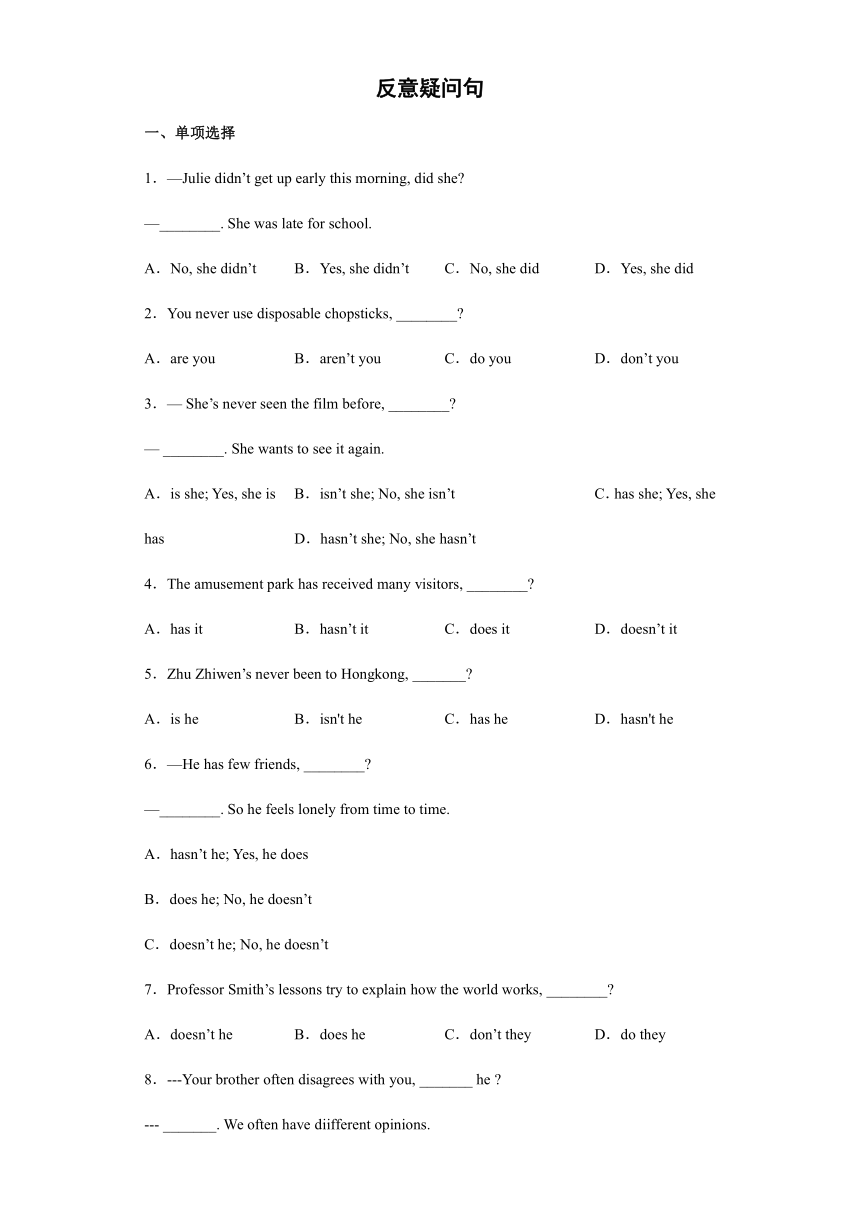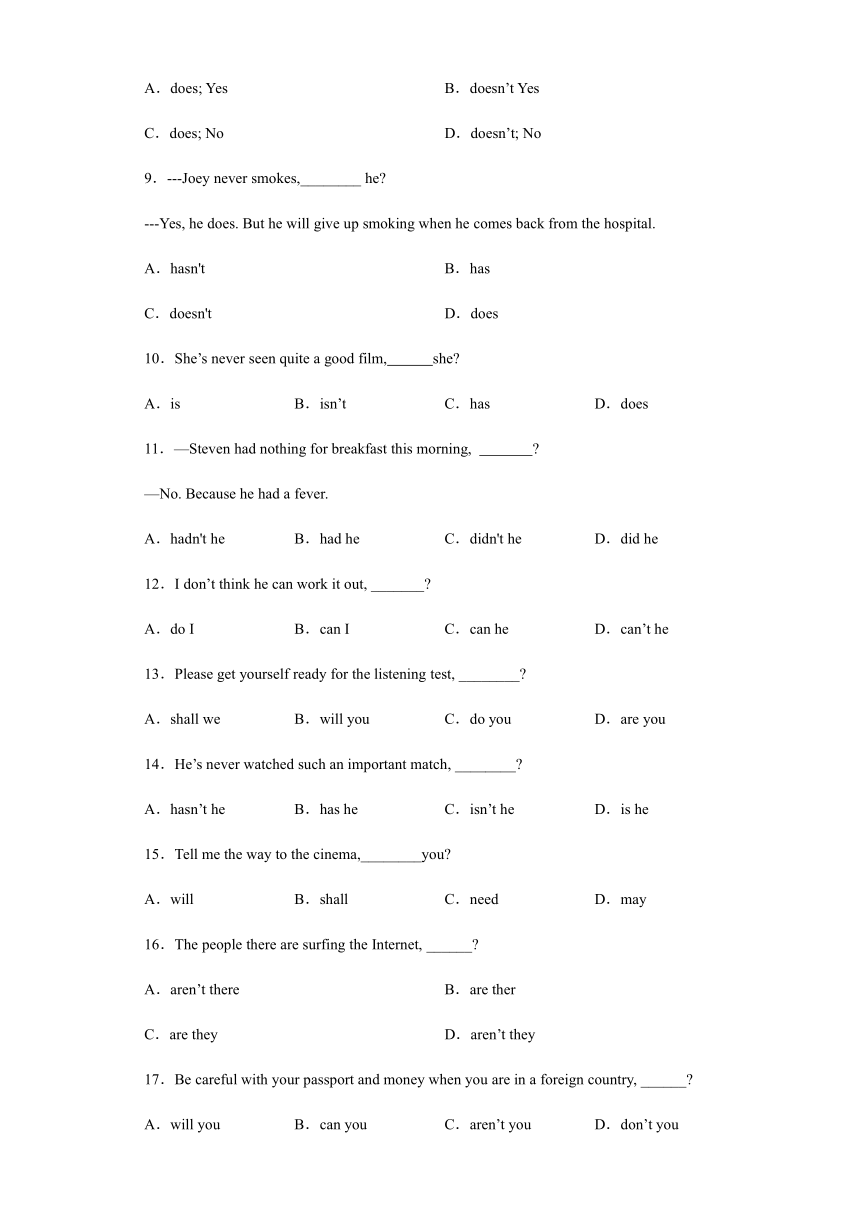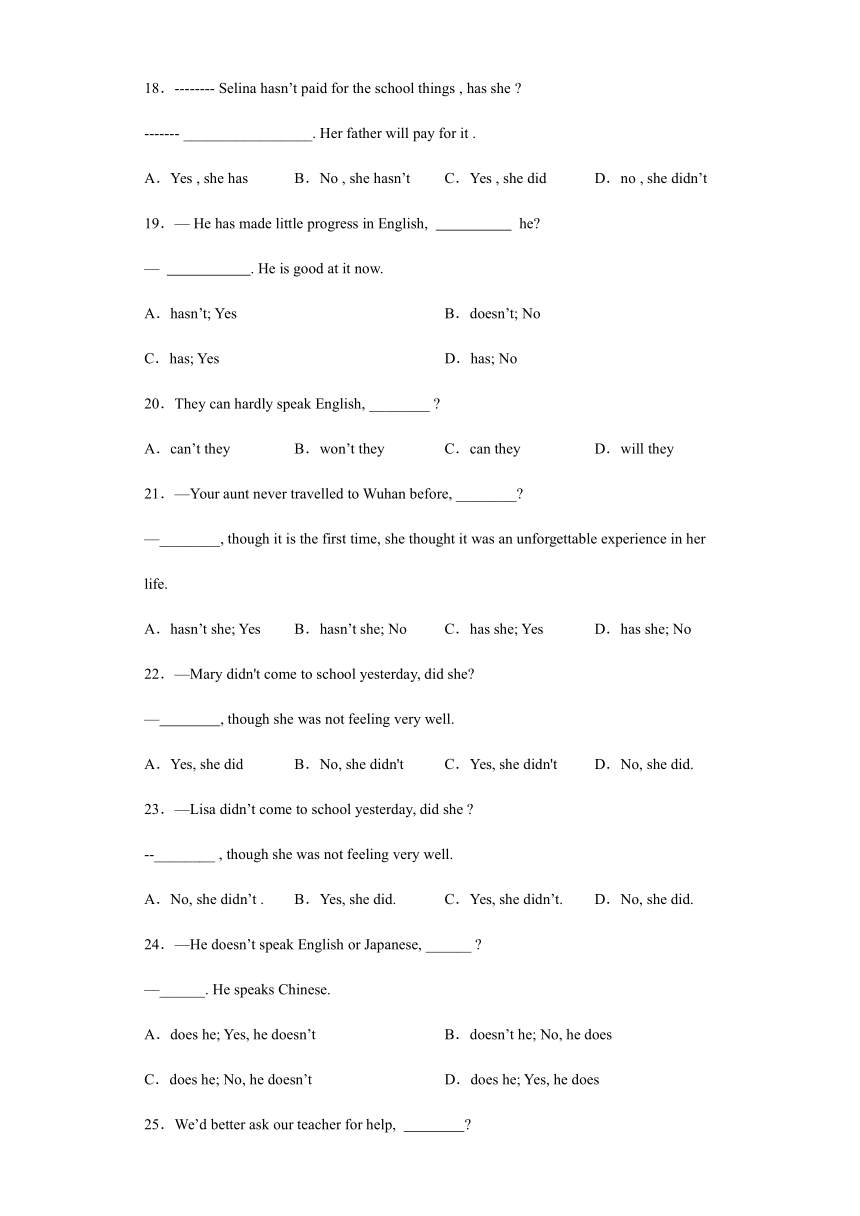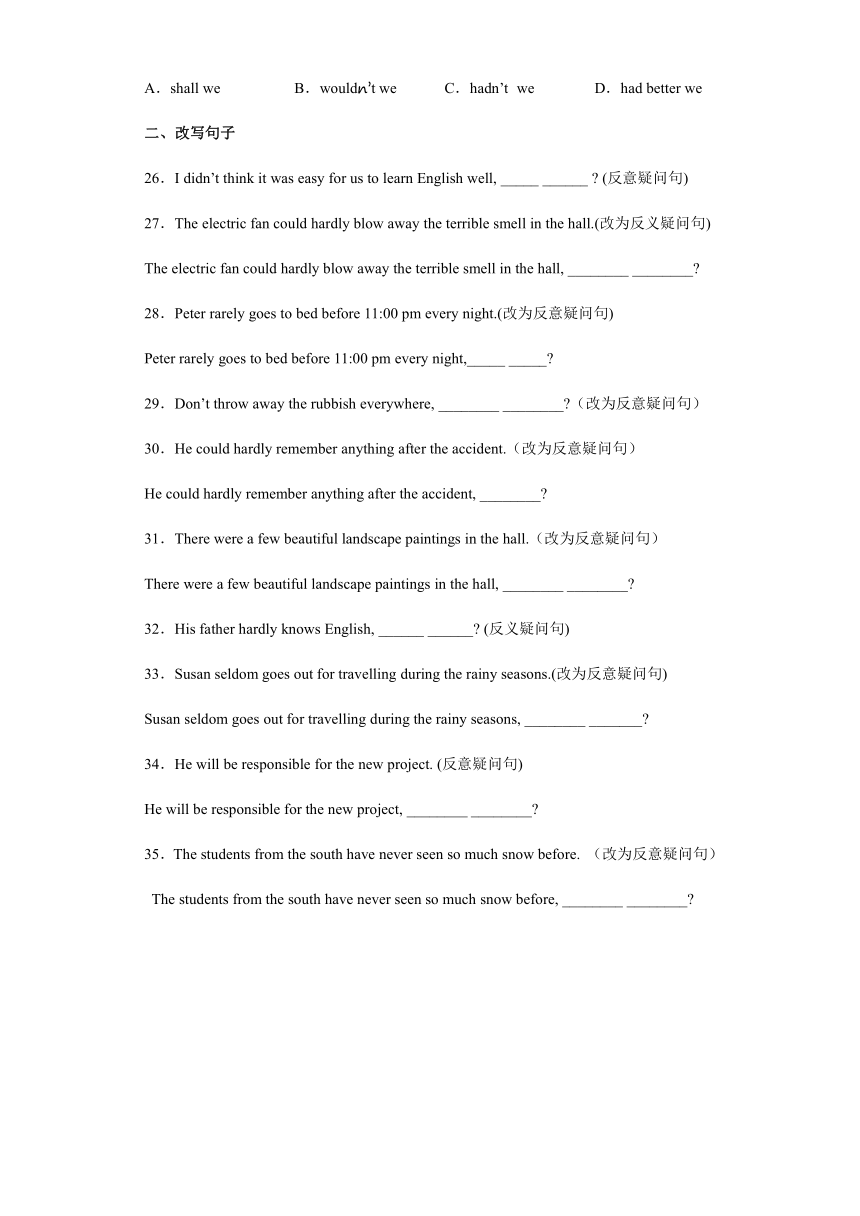反意疑问句考点专项练--2023年初中英语中考二轮复习(含答案)
文档属性
| 名称 | 反意疑问句考点专项练--2023年初中英语中考二轮复习(含答案) |  | |
| 格式 | docx | ||
| 文件大小 | 23.0KB | ||
| 资源类型 | 教案 | ||
| 版本资源 | 人教新目标(Go for it)版 | ||
| 科目 | 英语 | ||
| 更新时间 | 2023-03-19 08:47:02 | ||
图片预览




文档简介
反意疑问句
一、单项选择
1.—Julie didn’t get up early this morning, did she
—________. She was late for school.
A.No, she didn’t B.Yes, she didn’t C.No, she did D.Yes, she did
2.You never use disposable chopsticks, ________
A.are you B.aren’t you C.do you D.don’t you
3.— She’s never seen the film before, ________
— ________. She wants to see it again.
A.is she; Yes, she is B.isn’t she; No, she isn’t C.has she; Yes, she has D.hasn’t she; No, she hasn’t
4.The amusement park has received many visitors, ________
A.has it B.hasn’t it C.does it D.doesn’t it
5.Zhu Zhiwen’s never been to Hongkong, _______
A.is he B.isn't he C.has he D.hasn't he
6.—He has few friends, ________
—________. So he feels lonely from time to time.
A.hasn’t he; Yes, he does
B.does he; No, he doesn’t
C.doesn’t he; No, he doesn’t
7.Professor Smith’s lessons try to explain how the world works, ________
A.doesn’t he B.does he C.don’t they D.do they
8.---Your brother often disagrees with you, _______ he
--- _______. We often have diifferent opinions.
A.does; Yes B.doesn’t Yes
C.does; No D.doesn’t; No
9.---Joey never smokes,________ he
---Yes, he does. But he will give up smoking when he comes back from the hospital.
A.hasn't B.has
C.doesn't D.does
10.She’s never seen quite a good film, she
A.is B.isn’t C.has D.does
11.—Steven had nothing for breakfast this morning,
—No. Because he had a fever.
A.hadn't he B.had he C.didn't he D.did he
12.I don’t think he can work it out, _______
A.do I B.can I C.can he D.can’t he
13.Please get yourself ready for the listening test, ________
A.shall we B.will you C.do you D.are you
14.He’s never watched such an important match, ________
A.hasn’t he B.has he C.isn’t he D.is he
15.Tell me the way to the cinema,________you
A.will B.shall C.need D.may
16.The people there are surfing the Internet, ______
A.aren’t there B.are ther
C.are they D.aren’t they
17.Be careful with your passport and money when you are in a foreign country, ______
A.will you B.can you C.aren’t you D.don’t you
18.-------- Selina hasn’t paid for the school things , has she
------- _________________. Her father will pay for it .
A.Yes , she has B.No , she hasn’t C.Yes , she did D.no , she didn’t
19.— He has made little progress in English, he
— . He is good at it now.
A.hasn’t; Yes B.doesn’t; No
C.has; Yes D.has; No
20.They can hardly speak English, ________
A.can’t they B.won’t they C.can they D.will they
21.—Your aunt never travelled to Wuhan before, ________
—________, though it is the first time, she thought it was an unforgettable experience in her life.
A.hasn’t she; Yes B.hasn’t she; No C.has she; Yes D.has she; No
22.—Mary didn't come to school yesterday, did she
— , though she was not feeling very well.
A.Yes, she did B.No, she didn't C.Yes, she didn't D.No, she did.
23.—Lisa didn’t come to school yesterday, did she
--________ , though she was not feeling very well.
A.No, she didn’t . B.Yes, she did. C.Yes, she didn’t. D.No, she did.
24.—He doesn’t speak English or Japanese, ______
—______. He speaks Chinese.
does he; Yes, he doesn’t B.doesn’t he; No, he does
C.does he; No, he doesn’t D.does he; Yes, he does
25.We’d better ask our teacher for help,
A.shall we B.wouldn’t we C.hadn’t we D.had better we
二、改写句子
26.I didn’t think it was easy for us to learn English well, _____ ______ (反意疑问句)
27.The electric fan could hardly blow away the terrible smell in the hall.(改为反义疑问句)
The electric fan could hardly blow away the terrible smell in the hall, ________ ________
28.Peter rarely goes to bed before 11:00 pm every night.(改为反意疑问句)
Peter rarely goes to bed before 11:00 pm every night,_____ _____
29.Don’t throw away the rubbish everywhere, ________ ________ (改为反意疑问句)
30.He could hardly remember anything after the accident.(改为反意疑问句)
He could hardly remember anything after the accident, ________
31.There were a few beautiful landscape paintings in the hall.(改为反意疑问句)
There were a few beautiful landscape paintings in the hall, ________ ________
32.His father hardly knows English, ______ ______ (反义疑问句)
33.Susan seldom goes out for travelling during the rainy seasons.(改为反意疑问句)
Susan seldom goes out for travelling during the rainy seasons, ________ _______
34.He will be responsible for the new project. (反意疑问句)
He will be responsible for the new project, ________ ________
35.The students from the south have never seen so much snow before. (改为反意疑问句)
The students from the south have never seen so much snow before, ________ ________
参考答案:
1.A
考查反意疑问句。根据“She was late for school.”可知,她上学迟到了,所以起得不早,故选A。
2.C
考查反意疑问句。反意疑问句遵循“前肯定后否定,前否定后肯定”的原则,根据“never”可知,前半句为否定,故后面应该是肯定的,故排除B、D项。根据“use”可知,反意疑问句中应该用助动词do。故选C。
3.C
考查反意疑问句。反意疑问句由“陈述句+疑问尾句”两部分组成:前肯定,后否定或前否定,后肯定。根据“She’s never seen”可知前部分是否定,句子是现在完成时,后部分用助动词“has”放在主语“she”的前面。根据“She wants to see it again”可知她去看过电影,用“Yes, she has”。故选C。
4.B
考查反意疑问句。根据has received可知,前半句是现在完成时,是肯定句,后半句用否定形式,助动词用hasn’t ,故选B。
5.C
考查反义疑问句的用法。反义疑问句前面用肯定句,后面用否定句;前面用否定句,后面用肯定句。句意为“朱之文从没去过香港”,句子中有never, has been to。故选C。
6.B
考查反意疑问句。此处含反意疑问句,遵循“前肯后否,前否后肯”原则,few表示“几乎没有”,是否定含义,所以反意部分用肯定。故选B。
7.C
考查反意疑问句。根据句子结构可知,这里考查反意疑问句,根据“前肯后否,前否后肯”的原则,反意疑问句应用否定形式,先排除B和D;该句使用了一般现在时态,谓语动词“try”是实义动词,反意疑问句用助动词构成;主语“Professor Smith’s lessons”是复数,用代词they代替,故选C。
8.B
分析:考查反意疑问句的用法:主句肯定形式,反意部分用否定形式。因此用doesn’t; 通过答语我们有不同个人看法,所以用肯定回答。故选B
9.D
分析:考查反意疑问句的用法:主句是肯定形式,反意部分用否定形式;主句是否定形式,反意部分用肯定形式。分析:主句中用never,因此反意部分用肯定形式。故选 D
10.C
考查反意疑问句。根据主语she和谓语动词has seen判断句子的时态是单数第三人称现在完成时,反意疑问句的助动词用has;根据反意疑问句“前肯定后否定;前否定后肯定”的原则,陈述部分含有never,句意为否定,所以,疑问部分用肯定式“助动词+人称代词”;故选C。
11.D
考查反意疑问句。had是have(has)的过去式形式,助动词需用did的相关形式。根据nothing可知陈述句部分是否定句,所以反意疑问句需用肯定式did he,故选D。
12.C
考查反意疑问句。根据“I don’t think”可知,后跟宾语从句,否定应转移到从句,其反意疑问句在从句上变换,从句是否定,从句中主语是he,且含有情态动词can,因此其反意部分应用肯定,即can he。故选C。
13.B
考查祈使句的反意疑问句。在祈使句中除了let’s的反意疑问句要用shall we外,其余通常用will you。故选B。
14.B
考查反意疑问句。本句是反意疑问句,由never可知陈述部分是否定句,疑问部分需用肯定式,可排除AC两项;结合前面是现在完成时has done结构,后面的疑问部分要借助助动词has,故选B。
15.A
祈使句的反义疑问句除let’s开头了的,都可运用will you 结合句意和语境可知选A。
点睛:let’s开头祈使句的反义疑问句用shall we,例如,Let's go to school, shall we 而 Let us…的反义疑问句用will you,例如,Let us go swimming, will you
16.D
反意疑问句是英语四大问句之一,它是由一个陈述句加上一个短问句而构成的。反意疑问句的基本构成形式是:陈述句+动词(肯定或否定)+主语? 反意疑问句中问句部分的动词与陈述部分的动词在语气上成相反的对应关系,即:肯定+否定? 否定+肯定? 反意疑问句中问句部分的动词与陈述部分的动词种类要对应一致。反意疑问句中问句部分的动词在时态上应和陈述部分的时态一致。所以D。
17.A
A. will you你会吗?B. can you你能吗?C. aren’t you不是你吗?D. don’t you是吗?根据题干可知本句是一个祈使句,祈使句的反义疑问句是固定的,一般情况下用will you,故选A。
18.B
根据has she可知,回答应该用has,所以应该将CD排除;根据Her father will pay for it 可知,她没有付钱,应该说she hasn’t。所以本题选B。
19.C
前句是一个反意疑问句,反意疑问句由肯定的陈述句+否定的疑问尾句或是由否定的陈述句+肯定的疑问尾句构成的。Little意思是“很少,几乎没有”,意思是否定的,疑问尾句要用肯定的形式,前句是现在完成时态,尾句肯定形式用has he;对反义疑问句的回答,以事实为准,事实是肯定的,用yes作肯定回答;事实是否定的,用no作否定回答。本题由后句:他现在学得很好了。可知他进步大,事实是肯定的,用yes作答。故选C。
20.C
反义疑问句构成:(1)前肯后否:前句是肯定的陈述句,后句是否定的简短问句。例如,He went to the zoo, didn’t he (2)前否后肯:前句是否定的陈述句(句中有no,not,hardly,seldom,never,hardly ever,few,little等表示否定的词),后句是肯定的简短问句。例如,He doesn’t have breakfast, does he 本句前句有hardly(几乎不),可知后面使用肯定形式的简短问句,本句一般疑问句是把情态动词can提前,故填can they,选C。
21.D
考查反意疑问句。根据“Your aunt’s never travelled to Wuhan before,” 可知,此句为现在完成时,助动词has+过去分词。never表示否定意义,根据“前否后肯” 原则,第一空填has she。排除A项和B项。根据回答“though it is the first time, she thought it was an unforgettable experience in her life.” 可知,这是阿姨第一次去武汉,说明以前没去过。回答反意疑问句要根据实际情况来确定。此语境事实上是否定的,要用No来回答,排除C项。故选D。
22.A
考查反意疑问句的答语。反意疑问句要根据事实回答。C和D形式错误,排除。根据“though she was not feeling very well”可知,虽然她感觉不舒服,但是来上学了,用Yes,she did,故选A。
23.B
问句是反意疑问句,陈述部分didn’t come to school为否定式,疑问部分did she为肯定式,其回答往往与汉语不一致:yes不,no是的;需要特别注意。根据though she was not feeling very well.可知回答是否定的,故选B。
24.C
考查反意疑问句。反意疑问句要遵循“前否后肯,前肯后否”原则。由doesn’t可知第一个空应为does he;反意疑问句的答语要根据事实作答,肯定回答用“Yes+肯定结构”,否定回答用“No+否定结构”,根据“He speaks Chinese.”可知,此处为否定回答,用“No, he doesn’t.”。 25.C
反意疑问句的构成为如果前一部分用肯定式,后一部分一般用否定式;反之,前一部分为否定式,后一部分要用肯定式,即“前肯定后否定,前否定后肯定”。 当陈述部分有hardly, scarcely, barely, rarely, seldom, few, little, no, never, nothing, nobody, nowhere等否定词或半否定词时,反意疑问句部分要用肯定形式。We’d better do sth.我们最好做某事。We’d 为had better的所写,前面的陈述句为肯定,反意部分需用否定hadn’t.故答案为C.
26. was it
这里是I think后是宾语从句,并出现了否定前移,所以逗号后的疑问部分用肯定形式,故填was; it。
27. could it
反意疑问句结构:前肯定后否定,前否定后肯定。陈述部分hardly是否定词,疑问用肯定。疑问部分的情态动词要与陈述部分的保持一致,且主语用代词it来代替the electric fan,故填could;it。
28. does he
主句有rarely,反意疑问句要满足“前否后肯”,且主句是一般现在时,用助词does,主语是Peter所以用he来代替。故填does;he。
29. will或can you
根据“Don’t+动词原形”开头可知,该句中陈述部分为否定的祈使句,附加问句除了可用will you外,也可用can you,所以①空填will/can,②空填you。故填will/can;you。
30.could he
反意疑问句遵循“前肯后否,前否后肯”,陈述句中含有hardly,是否定意义,故疑问部分用肯定形式;根据“He could...”可知疑问部分借助情态动词could,后加主语he。故填could he。
31. weren’t there
反意疑问句构成有两种形式:(1)前句是肯定句,后句是简短的否定的一般疑问句;(2)前句是否定句,后句是简短的肯定的一般疑问句。此句“There were a few beautiful landscape paintings in the hall.”是there be的肯定句,时态为一般过去时,后句应用否定的一般疑问句,故填weren’t;there。
32. does he
由hardly可知,前面的陈述部分表示否定,根据反意疑问句“前否定后肯定”的原则”,疑问部分用肯定形式。结合knows可知,助动词用does,主语his father是指男性,代词用he,故填does;he。
33. does she
反意疑问句由“陈述句+疑问尾句”两部分组成,遵循“前肯后否,前否后肯”原则;根据“seldom”可知,陈述句是否定句,所以疑问句为肯定句。原句是一般现在时,句中goes是实义动词go的第三人称单数形式,所以助动词用“does”;故填does;she。
34. won’t he
根据will可知,疑问部分用否定,will的否定形式是won’t,代词用he,故填won’t;he。
35. have they
反义疑问句由两部分组成,前一部分是一个陈述句,后一部分是一个简短的疑问句,两部分的人称时态应保持一致;前肯后否,前否后肯;后一部分的主语用代词;原句用的是现在完成时,因此后一部分也该用现在完成时,前一部分中有never,是否定,因此后一部分用肯定,The students用代词they,故填 have;they。
一、单项选择
1.—Julie didn’t get up early this morning, did she
—________. She was late for school.
A.No, she didn’t B.Yes, she didn’t C.No, she did D.Yes, she did
2.You never use disposable chopsticks, ________
A.are you B.aren’t you C.do you D.don’t you
3.— She’s never seen the film before, ________
— ________. She wants to see it again.
A.is she; Yes, she is B.isn’t she; No, she isn’t C.has she; Yes, she has D.hasn’t she; No, she hasn’t
4.The amusement park has received many visitors, ________
A.has it B.hasn’t it C.does it D.doesn’t it
5.Zhu Zhiwen’s never been to Hongkong, _______
A.is he B.isn't he C.has he D.hasn't he
6.—He has few friends, ________
—________. So he feels lonely from time to time.
A.hasn’t he; Yes, he does
B.does he; No, he doesn’t
C.doesn’t he; No, he doesn’t
7.Professor Smith’s lessons try to explain how the world works, ________
A.doesn’t he B.does he C.don’t they D.do they
8.---Your brother often disagrees with you, _______ he
--- _______. We often have diifferent opinions.
A.does; Yes B.doesn’t Yes
C.does; No D.doesn’t; No
9.---Joey never smokes,________ he
---Yes, he does. But he will give up smoking when he comes back from the hospital.
A.hasn't B.has
C.doesn't D.does
10.She’s never seen quite a good film, she
A.is B.isn’t C.has D.does
11.—Steven had nothing for breakfast this morning,
—No. Because he had a fever.
A.hadn't he B.had he C.didn't he D.did he
12.I don’t think he can work it out, _______
A.do I B.can I C.can he D.can’t he
13.Please get yourself ready for the listening test, ________
A.shall we B.will you C.do you D.are you
14.He’s never watched such an important match, ________
A.hasn’t he B.has he C.isn’t he D.is he
15.Tell me the way to the cinema,________you
A.will B.shall C.need D.may
16.The people there are surfing the Internet, ______
A.aren’t there B.are ther
C.are they D.aren’t they
17.Be careful with your passport and money when you are in a foreign country, ______
A.will you B.can you C.aren’t you D.don’t you
18.-------- Selina hasn’t paid for the school things , has she
------- _________________. Her father will pay for it .
A.Yes , she has B.No , she hasn’t C.Yes , she did D.no , she didn’t
19.— He has made little progress in English, he
— . He is good at it now.
A.hasn’t; Yes B.doesn’t; No
C.has; Yes D.has; No
20.They can hardly speak English, ________
A.can’t they B.won’t they C.can they D.will they
21.—Your aunt never travelled to Wuhan before, ________
—________, though it is the first time, she thought it was an unforgettable experience in her life.
A.hasn’t she; Yes B.hasn’t she; No C.has she; Yes D.has she; No
22.—Mary didn't come to school yesterday, did she
— , though she was not feeling very well.
A.Yes, she did B.No, she didn't C.Yes, she didn't D.No, she did.
23.—Lisa didn’t come to school yesterday, did she
--________ , though she was not feeling very well.
A.No, she didn’t . B.Yes, she did. C.Yes, she didn’t. D.No, she did.
24.—He doesn’t speak English or Japanese, ______
—______. He speaks Chinese.
does he; Yes, he doesn’t B.doesn’t he; No, he does
C.does he; No, he doesn’t D.does he; Yes, he does
25.We’d better ask our teacher for help,
A.shall we B.wouldn’t we C.hadn’t we D.had better we
二、改写句子
26.I didn’t think it was easy for us to learn English well, _____ ______ (反意疑问句)
27.The electric fan could hardly blow away the terrible smell in the hall.(改为反义疑问句)
The electric fan could hardly blow away the terrible smell in the hall, ________ ________
28.Peter rarely goes to bed before 11:00 pm every night.(改为反意疑问句)
Peter rarely goes to bed before 11:00 pm every night,_____ _____
29.Don’t throw away the rubbish everywhere, ________ ________ (改为反意疑问句)
30.He could hardly remember anything after the accident.(改为反意疑问句)
He could hardly remember anything after the accident, ________
31.There were a few beautiful landscape paintings in the hall.(改为反意疑问句)
There were a few beautiful landscape paintings in the hall, ________ ________
32.His father hardly knows English, ______ ______ (反义疑问句)
33.Susan seldom goes out for travelling during the rainy seasons.(改为反意疑问句)
Susan seldom goes out for travelling during the rainy seasons, ________ _______
34.He will be responsible for the new project. (反意疑问句)
He will be responsible for the new project, ________ ________
35.The students from the south have never seen so much snow before. (改为反意疑问句)
The students from the south have never seen so much snow before, ________ ________
参考答案:
1.A
考查反意疑问句。根据“She was late for school.”可知,她上学迟到了,所以起得不早,故选A。
2.C
考查反意疑问句。反意疑问句遵循“前肯定后否定,前否定后肯定”的原则,根据“never”可知,前半句为否定,故后面应该是肯定的,故排除B、D项。根据“use”可知,反意疑问句中应该用助动词do。故选C。
3.C
考查反意疑问句。反意疑问句由“陈述句+疑问尾句”两部分组成:前肯定,后否定或前否定,后肯定。根据“She’s never seen”可知前部分是否定,句子是现在完成时,后部分用助动词“has”放在主语“she”的前面。根据“She wants to see it again”可知她去看过电影,用“Yes, she has”。故选C。
4.B
考查反意疑问句。根据has received可知,前半句是现在完成时,是肯定句,后半句用否定形式,助动词用hasn’t ,故选B。
5.C
考查反义疑问句的用法。反义疑问句前面用肯定句,后面用否定句;前面用否定句,后面用肯定句。句意为“朱之文从没去过香港”,句子中有never, has been to。故选C。
6.B
考查反意疑问句。此处含反意疑问句,遵循“前肯后否,前否后肯”原则,few表示“几乎没有”,是否定含义,所以反意部分用肯定。故选B。
7.C
考查反意疑问句。根据句子结构可知,这里考查反意疑问句,根据“前肯后否,前否后肯”的原则,反意疑问句应用否定形式,先排除B和D;该句使用了一般现在时态,谓语动词“try”是实义动词,反意疑问句用助动词构成;主语“Professor Smith’s lessons”是复数,用代词they代替,故选C。
8.B
分析:考查反意疑问句的用法:主句肯定形式,反意部分用否定形式。因此用doesn’t; 通过答语我们有不同个人看法,所以用肯定回答。故选B
9.D
分析:考查反意疑问句的用法:主句是肯定形式,反意部分用否定形式;主句是否定形式,反意部分用肯定形式。分析:主句中用never,因此反意部分用肯定形式。故选 D
10.C
考查反意疑问句。根据主语she和谓语动词has seen判断句子的时态是单数第三人称现在完成时,反意疑问句的助动词用has;根据反意疑问句“前肯定后否定;前否定后肯定”的原则,陈述部分含有never,句意为否定,所以,疑问部分用肯定式“助动词+人称代词”;故选C。
11.D
考查反意疑问句。had是have(has)的过去式形式,助动词需用did的相关形式。根据nothing可知陈述句部分是否定句,所以反意疑问句需用肯定式did he,故选D。
12.C
考查反意疑问句。根据“I don’t think”可知,后跟宾语从句,否定应转移到从句,其反意疑问句在从句上变换,从句是否定,从句中主语是he,且含有情态动词can,因此其反意部分应用肯定,即can he。故选C。
13.B
考查祈使句的反意疑问句。在祈使句中除了let’s的反意疑问句要用shall we外,其余通常用will you。故选B。
14.B
考查反意疑问句。本句是反意疑问句,由never可知陈述部分是否定句,疑问部分需用肯定式,可排除AC两项;结合前面是现在完成时has done结构,后面的疑问部分要借助助动词has,故选B。
15.A
祈使句的反义疑问句除let’s开头了的,都可运用will you 结合句意和语境可知选A。
点睛:let’s开头祈使句的反义疑问句用shall we,例如,Let's go to school, shall we 而 Let us…的反义疑问句用will you,例如,Let us go swimming, will you
16.D
反意疑问句是英语四大问句之一,它是由一个陈述句加上一个短问句而构成的。反意疑问句的基本构成形式是:陈述句+动词(肯定或否定)+主语? 反意疑问句中问句部分的动词与陈述部分的动词在语气上成相反的对应关系,即:肯定+否定? 否定+肯定? 反意疑问句中问句部分的动词与陈述部分的动词种类要对应一致。反意疑问句中问句部分的动词在时态上应和陈述部分的时态一致。所以D。
17.A
A. will you你会吗?B. can you你能吗?C. aren’t you不是你吗?D. don’t you是吗?根据题干可知本句是一个祈使句,祈使句的反义疑问句是固定的,一般情况下用will you,故选A。
18.B
根据has she可知,回答应该用has,所以应该将CD排除;根据Her father will pay for it 可知,她没有付钱,应该说she hasn’t。所以本题选B。
19.C
前句是一个反意疑问句,反意疑问句由肯定的陈述句+否定的疑问尾句或是由否定的陈述句+肯定的疑问尾句构成的。Little意思是“很少,几乎没有”,意思是否定的,疑问尾句要用肯定的形式,前句是现在完成时态,尾句肯定形式用has he;对反义疑问句的回答,以事实为准,事实是肯定的,用yes作肯定回答;事实是否定的,用no作否定回答。本题由后句:他现在学得很好了。可知他进步大,事实是肯定的,用yes作答。故选C。
20.C
反义疑问句构成:(1)前肯后否:前句是肯定的陈述句,后句是否定的简短问句。例如,He went to the zoo, didn’t he (2)前否后肯:前句是否定的陈述句(句中有no,not,hardly,seldom,never,hardly ever,few,little等表示否定的词),后句是肯定的简短问句。例如,He doesn’t have breakfast, does he 本句前句有hardly(几乎不),可知后面使用肯定形式的简短问句,本句一般疑问句是把情态动词can提前,故填can they,选C。
21.D
考查反意疑问句。根据“Your aunt’s never travelled to Wuhan before,” 可知,此句为现在完成时,助动词has+过去分词。never表示否定意义,根据“前否后肯” 原则,第一空填has she。排除A项和B项。根据回答“though it is the first time, she thought it was an unforgettable experience in her life.” 可知,这是阿姨第一次去武汉,说明以前没去过。回答反意疑问句要根据实际情况来确定。此语境事实上是否定的,要用No来回答,排除C项。故选D。
22.A
考查反意疑问句的答语。反意疑问句要根据事实回答。C和D形式错误,排除。根据“though she was not feeling very well”可知,虽然她感觉不舒服,但是来上学了,用Yes,she did,故选A。
23.B
问句是反意疑问句,陈述部分didn’t come to school为否定式,疑问部分did she为肯定式,其回答往往与汉语不一致:yes不,no是的;需要特别注意。根据though she was not feeling very well.可知回答是否定的,故选B。
24.C
考查反意疑问句。反意疑问句要遵循“前否后肯,前肯后否”原则。由doesn’t可知第一个空应为does he;反意疑问句的答语要根据事实作答,肯定回答用“Yes+肯定结构”,否定回答用“No+否定结构”,根据“He speaks Chinese.”可知,此处为否定回答,用“No, he doesn’t.”。 25.C
反意疑问句的构成为如果前一部分用肯定式,后一部分一般用否定式;反之,前一部分为否定式,后一部分要用肯定式,即“前肯定后否定,前否定后肯定”。 当陈述部分有hardly, scarcely, barely, rarely, seldom, few, little, no, never, nothing, nobody, nowhere等否定词或半否定词时,反意疑问句部分要用肯定形式。We’d better do sth.我们最好做某事。We’d 为had better的所写,前面的陈述句为肯定,反意部分需用否定hadn’t.故答案为C.
26. was it
这里是I think后是宾语从句,并出现了否定前移,所以逗号后的疑问部分用肯定形式,故填was; it。
27. could it
反意疑问句结构:前肯定后否定,前否定后肯定。陈述部分hardly是否定词,疑问用肯定。疑问部分的情态动词要与陈述部分的保持一致,且主语用代词it来代替the electric fan,故填could;it。
28. does he
主句有rarely,反意疑问句要满足“前否后肯”,且主句是一般现在时,用助词does,主语是Peter所以用he来代替。故填does;he。
29. will或can you
根据“Don’t+动词原形”开头可知,该句中陈述部分为否定的祈使句,附加问句除了可用will you外,也可用can you,所以①空填will/can,②空填you。故填will/can;you。
30.could he
反意疑问句遵循“前肯后否,前否后肯”,陈述句中含有hardly,是否定意义,故疑问部分用肯定形式;根据“He could...”可知疑问部分借助情态动词could,后加主语he。故填could he。
31. weren’t there
反意疑问句构成有两种形式:(1)前句是肯定句,后句是简短的否定的一般疑问句;(2)前句是否定句,后句是简短的肯定的一般疑问句。此句“There were a few beautiful landscape paintings in the hall.”是there be的肯定句,时态为一般过去时,后句应用否定的一般疑问句,故填weren’t;there。
32. does he
由hardly可知,前面的陈述部分表示否定,根据反意疑问句“前否定后肯定”的原则”,疑问部分用肯定形式。结合knows可知,助动词用does,主语his father是指男性,代词用he,故填does;he。
33. does she
反意疑问句由“陈述句+疑问尾句”两部分组成,遵循“前肯后否,前否后肯”原则;根据“seldom”可知,陈述句是否定句,所以疑问句为肯定句。原句是一般现在时,句中goes是实义动词go的第三人称单数形式,所以助动词用“does”;故填does;she。
34. won’t he
根据will可知,疑问部分用否定,will的否定形式是won’t,代词用he,故填won’t;he。
35. have they
反义疑问句由两部分组成,前一部分是一个陈述句,后一部分是一个简短的疑问句,两部分的人称时态应保持一致;前肯后否,前否后肯;后一部分的主语用代词;原句用的是现在完成时,因此后一部分也该用现在完成时,前一部分中有never,是否定,因此后一部分用肯定,The students用代词they,故填 have;they。
同课章节目录
- 词法
- 名词
- 动词和动词短语
- 动词语态
- 动词时态
- 助动词和情态动词
- 非谓语动词
- 冠词
- 代词
- 数词和量词
- 形容词副词及其比较等级
- 介词和介词短语
- 连词和感叹词
- 构词法
- 相似、相近词比较
- 句法
- 陈述句
- 一般疑问句和否定疑问句
- 特殊疑问句及选择疑问句
- 反意疑问句
- 存在句(There be句型)
- 宾语从句
- 定语从句
- 状语从句
- 主谓一致问题
- 简单句
- 并列句
- 复合句
- 主谓一致
- 主、表语从句
- 名词性从句
- 直接引语和间接引语
- 虚拟语气
- 感叹句
- 强调句
- 倒装句
- 祈使句
- 句子的成分
- 句子的分类
- 题型专区
- 单项选择部分
- 易错题
- 完形填空
- 阅读理解
- 词汇练习
- 听说训练
- 句型转换
- 补全对话
- 短文改错
- 翻译
- 书面表达
- 任务型阅读
- 语法填空
- 其他资料
